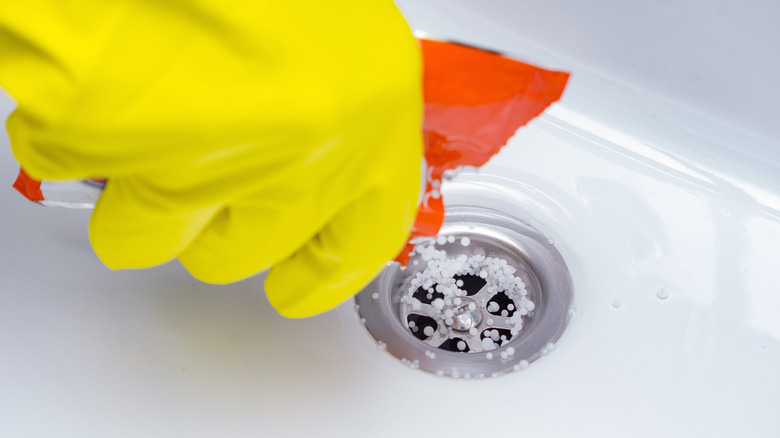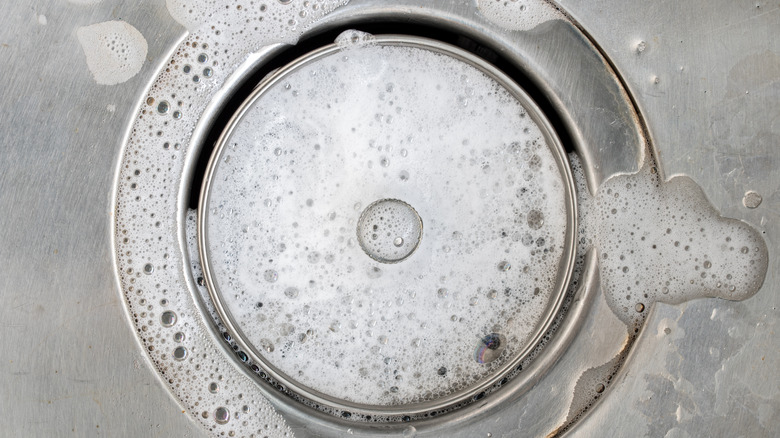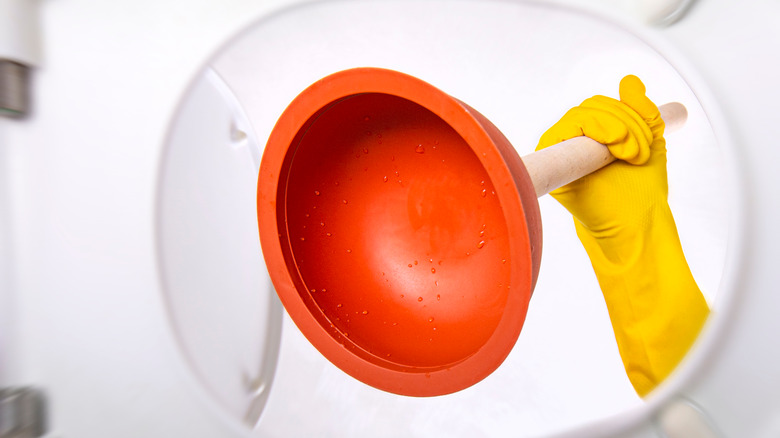Why You Should Stop Using Drain Cleaners In Your Pipes Immediately
Everyone, at least at one point, has successfully waged war against clogged drains; but you need to retire your chemical drain cleaner right away. They can weaken the pipes or cause leaks that could result in pipe failure. Their potent, caustic chemicals can also harm you and threaten the environment.
Drain cleaners, whether chemical, acid, or oxidizing, can be devastating to one's plumbing because their chemical components include lye, potash, bleach, sodium hydroxide, and nitrates, via Roto-Rooter. Some even contain sulfuric acid, manufactured for extremely clogged drains. These elements are dangerous, and prolonged usage can contribute to early pipe replacement, among other things. Even though drain cleaners are readily available in the U.S., the European Union labels most of them as harmful and has banned several for commercial use.
Good Housekeeping points out that several natural remedies or mechanical devices are available for a safe unclogging of those pesky drains. Though perhaps not as fast-acting as their chemical counterparts, they are efficient, nonetheless.
They're extremely damaging
Today's pipes are typically plastic, composed of polyvinyl chloride (PVC) or acrylonitrile butadiene styrene (ABS). They are vulnerable to the caustic effects of the harsh chemicals in drain cleaners, as are older metal pipes. Long-term exposure to these chemicals can cause holes to form in the pipes; in part, this is due to the heat that sodium hydroxide-based cleaners generate to do their work. According to SFGate, when blasting through a clog, the chemicals in drain cleaners can dissolve the glue holding the pipes together and even melt off the plastic. The Plumber Guy also warns that chemical drain cleaners can kill off the essential bacteria in your septic system responsible for naturally breaking down waste.
If chemical clog busters can inflict this much damage, imagine what they can do to one's eyes, skin, and lungs. Inhaling harmful fumes or simply being in contact with these corrosive substances can result in allergy reactions, burns, or rashes. Similarly, ingestion can be fatal, making children and pets particularly vulnerable. After years of prolonged use, the chemicals could eventually travel from the sewer system into nearby waterways, harming flora and fauna.
Safer substitutes
Everyday household products, enzymatic cleaners, and implements such as snakes and plungers are benign alternatives to using harsh chemicals. Even wire hangers can help to clear your drains. A barbed hook, like a mini-snake, is also available to remove hair clogs from sinks or drains.
Kitchen staples including vinegar, baking soda, and dish soap can substitute for chemical drain cleaners. Coffee grounds, hot water, and hydrogen peroxide can all be used to clear drains. These are environmentally sound, readily available, and relatively inexpensive choices. Greener Ideal suggests pouring 3/4 cup of baking soda into a clogged drain, followed by 1/2 cup of vinegar. Cover immediately to prevent blowback. Let the mixture work its magic for 30 minutes, then uncover and slowly pour in boiling water. The foam generated by combining 1 cup of hydrogen peroxide and 1 tablespoon of baking soda can also work. Plant-based enzymatic cleaners are particularly helpful against built-up grease, and even restaurants use them for their oil traps. They are biodegradable, and repeated use will not harm the pipes. Let the cleaner sit overnight in a slow-moving drain for best results.
This Old House is not a staunch proponent of the chancy chemical cleaners, which they say are even fairly useless against actual stoppages. So, they offer several home-plumbing tips, three of which are as follows. Call a pro if your clogged drain withstands your attempts to clear it, don't be over-zealous lest you risk damaging the pipes, and wear safety goggles and gloves.


